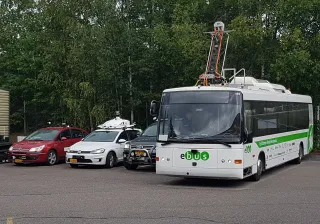Petri Söderena was nominated as an interim vice president to VTT’s Mobility & Transport research area in January 2024. He advocates wide-scale electrification of transport and believes that drones will revolutionise future transport.
Petri Söderena has been studying transportation-related topics his whole worklife. More specifically, his specialty is heavy-duty traffic, concentrating in particular on roads, ships, and work machinery. After completing his master’s at the Aalto University School of Engineering in early 2014, Söderena went to AGCO Power to work with combustion engines. AGCO Power is world’s third largest agricultural machinery manufacturer and there Söderena got to work with combustion engine energy efficiency and emission reduction solutions in various R&D projects.
After progressing from a researcher to a research team lead at AGCO Power Söderena decided to move to VTT, where he still works at. “Throughout my career I have studied heavy-duty vehicles. AGCO Power provided a good start to this work. However, at VTT I have truly been able to study energy efficiency and renewable energy alternatives from multiple viewpoints, in vehicles and in transportation in general”, describes Söderena his work’s progress.
From senior scientist to research area vice president
“I started at VTT as a senior scientist in 2016 and in 2020 got a team to lead. And even before my team lead role I had managed several projects. Leadership has been a part of my job for a long time. However, getting an actual team to lead broadened my horizon. Now the recent nomination as an interim vice president opens even more opportunities. Now I am able, together with my team, to contribute to mobility and transportation solutions with a wider perspective”, tells Söderena about his career at VTT.
The team Söderena earlier led is part of the Mobility & Transport research area. Central research topics of the area include reducing energy consumption, renewable and sustainable power sources, transportation automation solutions, digitalization of traffic, as well as mobility services and solutions in general.
“This research area, founded in 2020, concentrates broadly on investigating and improving traffic and transportation solutions. We gathered top teams and researchers across VTT to join this research area. Naturally mobility and transportation solutions have existed at VTT as research topics already before. They just were scattered across the organization before this restructuring. Now it is great that we have collected the experts working on this topics under the same umbrella. Together we can develop solutions aiming towards more energy efficient and carbon neutral traffic. We have even research on human behavior, as well as on mobility solutions and habits”, praises Söderena the diversity of his research area’s competencies.
Future prospects in traffic
Traffic is fast becoming electric, faster than most of us could predict only a few years ago. A layman can witness this in particular in private cars, but it concerns heavy traffic as well. Public transportation is going through a transformation towards electric buses and other zero-emission vehicles. Also trucks are going towards this direction, partly enforced by EU regulations. Furthermore, also in the area of work machinery there is interest in new technologies, even without direct EU guidance.
In the most heavy traffic, work machinery, as well as maritime transport, combustion engines are still needed. This is why Mobility & Transport also investigates different ways to improve them. “Our mode of operating is technology-neutral. Our aim is to advance the shift towards letting fossil fuels go and reduce energy consumption. In this way we support the society’s transformation towards carbon neutrality, regardless of the technological choices.”
New battery solutions and electric power lines have a central role in the research of Mobility & Transport. Carbon-neutral and low-emission combustion engines are also an integral part of solutions concerning things that are difficult to electrify. In addition, automatic driving and the digitalization of traffic create new opportunities for example on production improvements and energy consumption reduction. They also enable whole new business models for various production lines in the air, road, sea, as well as terrain.
As one interesting new research topic Söderena mentions drones and robotics in general. “With drones we can do things that would be expensive, difficult, or downright impossible with manned vehicles. We can for example deliver critical medicine in places otherwise be difficult to reach. People will move around also in the future, most likely more than ever before. All this should be enabled with less energy consumption and without carbon emissions. We probably won’t run out of research topics in a while”, concludes Söderena.





